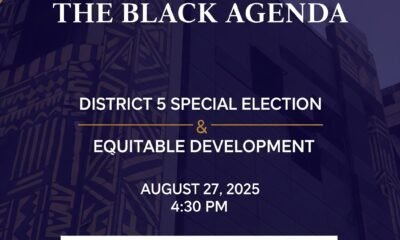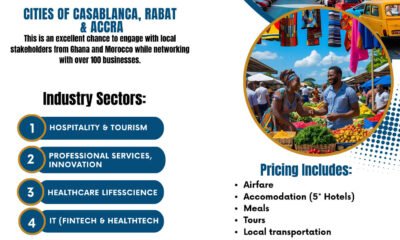News
Democrats Eye a Major Shift in How Corporations Are Taxed
Published
4 years agoon

WASHINGTON — At the center of the new climate and tax package that Democrats appear to be on the verge of passing is one of the most significant changes to America’s tax code in decades: a new corporate minimum tax that could reshape how the federal government collects revenue and alter how the nation’s most profitable companies invest in their businesses.
The proposal is one of the last remaining tax increases in the package that Democrats are aiming to pass along party lines in coming days. After months of intraparty disagreement over whether to raise taxes on the wealthy or roll back some of the 2017 Republican tax cuts to fund their agenda, they have settled on a longstanding political ambition to ensure that large and profitable companies pay more than $0 in federal taxes.
To accomplish this, Democrats have recreated a policy that was last employed in the 1980s: trying to capture tax revenue from companies that report a profit to shareholders on their financial statements while bulking up on deductions to whittle down their tax bills.
The re-emergence of the corporate minimum tax, which would apply to what’s known as the “book income” that companies report on their financial statements, has prompted confusion and fierce lobbying resistance since it was announced last month.
Some initially conflated the measure with the 15 percent global minimum tax that Treasury Secretary Janet L. Yellen has been pushing as part of an international tax deal. However, that is a separate proposal, which in the United States remains stalled in Congress, that would apply to the foreign earnings of American multinational companies.
Republicans have also misleadingly tried to seize on the tax increase as evidence that President Biden was ready to break his campaign promises and raise taxes on middle-class workers. And manufacturers have warned that it would impose new costs at a time of rapid inflation.
In a sign of the political power of lobbyists in Washington, by Thursday evening the new tax had already been watered down. At the urging of manufacturers, Senator Kyrsten Sinema of Arizona persuaded her Democratic colleagues to preserve a valuable deduction, known as bonus depreciation, that is associated with purchases of machinery and equipment.
The new 15 percent minimum tax would apply to corporations that report annual income of more than $1 billion to shareholders on their financial statements but use deductions, credits and other preferential tax treatments to reduce their effective tax rates well below the statutory 21 percent. It was originally projected to raise $313 billion in tax revenue over a decade, though the final tally is likely to be $258 billion once the revised bill is finalized.
The new tax could also inject a greater degree of complexity into the tax code, creating challenges in carrying out the law if it is passed.
“In terms of implementation and just bandwidth to deal with the complexity, there’s no doubt that this regime is complex,” said Peter Richman, a senior attorney adviser at the Tax Law Center at New York University’s law school. “This is a big change and the revenue number is large.”
What’s in the Democrats’ Climate and Tax Bill
A new proposal. The $369 billion climate and tax package that Senate Democrats proposed in July could have far-reaching effects on the environment and the economy. Here are some of the key provisions:
Auto industry. Currently, taxpayers can get up to $7,500 in tax credits for purchasing an electric vehicle, but there is a cap on how many cars from each manufacturer are eligible. The new bill would eliminate this cap and extend the tax credit until 2032; used cars would also qualify for a credit of up to $4,000.
Energy industry. The bill would provide billions of dollars in rebates for Americans who buy energy efficient and electric appliances and tax credits for companies that build new sources of emissions-free electricity, such as wind turbines and solar panels. It would also set aside $60 billion to encourage clean energy manufacturing in the United States. It would also require businesses to pay a financial penalty per metric ton for methane emissions that exceed federal limits starting in 2024.
Low-income communities. The bill would invest over $60 billion to support low-income communities and communities of color that are disproportionately burdened by effects of climate change. This includes grants for zero-emissions technology and vehicles, as well as money to mitigate the negative effects of highways, bus depots and other transportation facilities.
Fossil fuels industry. The bill would require the federal government to auction off more public lands and waters for oil drilling and expand tax credits for coal and gas-burning plants that rely on carbon capture technology. These provisions are among those that were added to gain the support of Senator Joe Manchin III, Democrat of West Virginia.
West Virginia. The bill would also bring big benefits to Mr. Manchin’s state, the nation’s second-largest producer of coal, making permanent a federal trust fund to support miners with black lung disease and offering new incentives for companies to build wind and solar farms in areas where coal mines or coal plants have recently closed.
Because of that complexity, the corporate minimum tax has faced substantial skepticism. It is less efficient than simply eliminating deductions or raising the corporate tax rate and could open the door for companies to find new ways to make their income appear lower to reduce their tax bills.
Similar versions of the idea have been floated by Mr. Biden during his presidential campaign and by Senator Elizabeth Warren, Democrat of Massachusetts. They have been promoted as a way to restore fairness to a tax system that has allowed major corporations to dramatically lower their tax bills through deductions and other accounting measures.
According to an early estimate from the nonpartisan Joint Committee on Taxation, the tax would most likely apply to about 150 companies annually, and the bulk of them would be manufacturers. That spurred an outcry from manufacturing companies and Republicans, who have been opposed to any policies that scale back the tax cuts that they enacted five years ago.
Although many Democrats acknowledge that the corporate minimum tax was not their first choice of tax hikes, they have embraced it as a political winner. Senator Ron Wyden of Oregon, the chairman of the Senate Finance Committee, shared Joint Committee on Taxation data on Thursday indicating that in 2019, about 100 to 125 corporations reported financial statement income greater than $1 billion, yet their effective tax rates were lower than 5 percent. The average income reported on financial statements to shareholders was nearly $9 billion, but they paid an average effective tax rate of just 1.1 percent.
“Companies are paying rock-bottom rates while reporting record profits to their shareholders,” Mr. Wyden said.
The Treasury Department had reservations about the minimum tax idea last year because of its complexity. If enacted, Treasury would be responsible for crafting a raft of new regulations and guidance for the new law and for ensuring that the Internal Revenue Service could properly police it.
Michael J. Graetz, a tax law professor at Columbia University, acknowledged that calculating minimum taxes was complicated and that introducing a new tax base would add new challenges from a tax administration perspective, but he said that he did not view those obstacles as disqualifying. He noted that the current system had created opportunities for tax shelters and allowed companies to take losses for tax purposes that do not show up on their financial statements.
“If the problem that Congress is addressing is that companies are reporting high book profits and low taxes, then the only way to align those two is to base taxes on book profits to some extent,” Mr. Graetz, a former deputy assistant secretary for tax policy at the Treasury Department, said.
A similar version of the tax was included in a 1986 tax overhaul and allowed to expire after three years. Skeptics of revisiting such a measure have warned that it could create new problems and opportunities for companies to avoid the minimum tax.
“The evidence from the studies of outcomes around the Tax Reform Act of 1986 suggest that companies responded to such a policy by altering how they report financial accounting income — companies deferred more income into future years,” Michelle Hanlon, an accounting professor at the Sloan School of Management at the Massachusetts Institute of Technology, told the Senate Finance Committee last year. “This behavioral response poses serious risks for financial accounting and the capital markets.”
Other opponents of the new tax have expressed concerns that it would give more control over the U.S. tax base to the Financial Accounting Standards Board, an independent organization that sets accounting rules.
“The potential politicization of the F.A.S.B. will likely lead to lower-quality financial accounting standards and lower-quality financial accounting earnings,” Ms. Hanlon and Jeffrey L. Hoopes, a University of North Carolina professor, wrote in a letter to members of Congress last year that was signed by more than 260 accounting academics.
Business groups have pushed back hard against the proposal and pressured Ms. Sinema to block the tax entirely. The National Association of Manufacturers and Arizona Chamber of Commerce and Industry released on Wednesday a poll of manufacturing workers, managers and advocates in the state that showed a majority opposed the new tax.
“It will make it harder to hire more workers, raise wages and invest in our communities,” said Chad Moutray, the chief economist of the manufacturing association. “Arizona’s manufacturing voters are clearly saying that this tax will hurt our economy.”
Ms. Sinema has expressed opposition to increasing tax rates and had reservations about a proposal to scale back the special tax treatment that hedge fund managers and private equity executives receive for “carried interest.” Democrats scrapped the proposal at her urging.
When an earlier version of a corporate minimum tax was proposed last October, Ms. Sinema issued an approving statement.
“This proposal represents a common sense step toward ensuring that highly profitable corporations — which sometimes can avoid the current corporate tax rate — pay a reasonable minimum corporate tax on their profits, just as everyday Arizonans and Arizona small businesses do,” she said. In announcing that she would back an amended version of the climate and tax bill on Thursday, Ms. Sinema noted that it would “protect advanced manufacturing.”
That won plaudits from business groups on Friday.
“Taxing capital expenditures — investments in new buildings, factories, equipment, etc. — is one of the most economically destructive ways you can raise taxes,” Neil Bradley, chief policy officer of the U.S. Chamber of Commerce, said in a statement. He added, “While we look forward to reviewing the new proposed bill, Senator Sinema deserves credit for recognizing this and fighting for changes.”
Emily Cochrane contributed reporting.
Read the full article here
A journalist since 1994, he also founded DMGlobal Marketing & Public Relations. Glover has an extensive list of clients including corporations, non-profits, government agencies, politics, business owners, PR firms, and attorneys.

Business
My ancestors were full-blooded Indians … until the census said otherwise
Published
6 months agoon
August 17, 2025
(OKLAHOMA – August 17, 2025) – When I first started researching my family’s genealogy, I thought I was just going to fill in a few blanks.
Instead, I uncovered a lie so deep, so systematic, it reshaped everything I thought I knew about who we are as a people.
I want to show you something personal.
Below, you’ll see two official U.S. government records—both documenting one of my direct ancestors. Thomas Jefferson Adams Harjo.

Creek Nation certificate
📜 The first is from the Dawes Roll, the federal list created in the early 1900s to register members of the Five Civilized Tribes.
As you’ll see, my ancestor is listed as a Full-Blood Indian—a clear acknowledgment of their tribal heritage and cultural identity.

1900 US Census
But then, take a look at the second image:
📄 That’s the federal census record from just a few years later.
Same ancestor.
Same location.
But this time, the government marked them as Negro.
No tribe. No Indian classification.
Just folded into the general Black population—without consent, without explanation.
That wasn’t a mistake.
That was paper genocide.
This is what happened to millions of Indigenous Black Americans across the South.
Their identities were stripped away on paper—one document at a time—by a system designed to erase, absorb, and exploit.
This wasn’t just about racism. It was about land, power, and control.
By reclassifying tribal people as Negro or Colored, the government could:
-
Deny them land rights
-
Remove them from tribal rolls
-
Steal their inheritance
-
And make sure future generations never knew who they really were
This is why so many of our elders say, “My grandma said we had Indian in us.”
They weren’t lying.
They just didn’t have the tools to prove it.
Now we do.
And I’m not showing you this to just share my story—I’m showing you because this might be your story, too.
If you’re ready to go deeper, tomorrow I’m going to pull back the curtain on how far this went—how the reclassification of Black Indians was not an exception, but the rule across the Southeast.
You’re not crazy.
You’re not reaching.
You’re remembering.
—Mike
Founder, Native Black Ancestry
News
Voices of West Tampa: District 5 Special Election Forum, Aug. 27th
Published
6 months agoon
August 12, 2025
(TAMPA, FL – August 12, 2025) – The Black Agenda is coming! Join us this August for a powerful virtual town hall where residents, neighborhood associations, nonprofit leaders, faith communities, and other key stakeholders will come together to share their concerns and discuss solutions.
![]() This event will be streamed live and will feature candidates offering their vision for the future of West Tampa.
This event will be streamed live and will feature candidates offering their vision for the future of West Tampa.
This will be a street-level, bottom-up dialogue—focused on real voices, real stories, and real strategies to protect and uplift our community.
https://us02web.zoom.us/…/register/n2MwP53TQ-2e9xfih1rrAg

Join us this August for a powerful virtual town hall.
News
From Illinois to Texas, CTU President Stacy Davis Gates Leads Largest African American Parade in the Country Amid National Education and Democracy Attacks
Published
6 months agoon
August 8, 2025
(CHICAGO – August 8, 2025) – This Saturday, internationally recognized labor leader and Chicago Teachers Union President Stacy Davis Gates will serve as an Honorary Marshal at the 96th Annual Bud Billiken Parade, the largest African American parade in the United States.
Why Does This Matter?
- Back To School: As families nationwide prepare for the academic year, the Chicago Teachers Union will usher it in by continuing the call for Chicago’s 300,000+ students to have the schools they deserve.
- Texas: State-level fights over education and democracy in Illinois resonate across the nation. Illinois is currently hosting Texas Democratic leaders who are fighting shared policy battles including public education funding and labor protections.
- National Relevance: The Chicago Teachers Union is one of the most powerful teachers’ unions in the country. When America catches a cold, Chicago catches the flu, but its leaders continue to push back on attacks against equality and opportunity. It is the third-largest local teachers union in the country and the largest local union in Illinois.
“DOGE already happened in Chicago. Our public school system was ravaged by the types of policies that are being implemented at the federal level right now: summarily firing female workers, Black female workers from the schools; closing schools—Rahm Emanuel closed fifty of them.” – Stacy Davis Gates (May 2025)
________________________________________________
About Stacy Davis Gates
- A working mother and high school social studies teacher.
- Led the historic 2019 CTU strike, securing smaller class sizes, sanctuary protections for immigrant students and the right to teach Black history.
- Raised millions to elect pro-education and pro-worker candidates including Mayor Brandon Johnson and fought for equitable school funding.
- Serves as Executive Vice President of the Illinois Federation of Teachers, Vice President of the American Federation of Teachers, Party Chair of United Working Families, and board member of the Action Center on Race & the Economy (ACRE).
- Is one of the next-generation labor leaders that you are going to want to get to know. She is going to help define what union leadership looks like in the coming years.

Stacy Davis Gates

Remember Who You Are: The Indigenous Series 📱

Remember Who You Are: The Indigenous Series

Indigenous Series: Reclaiming Our Legacy 📱

Indigenous Series: Reclaiming Our Legacy

Indigenous Series: Save Our Legacy

Remember Who You Are: The Indigenous Series

Remember Who You Are: The Indigenous Series 📱

Indigenous Series: Reclaiming Our Legacy

Indigenous Series: Reclaiming Our Legacy 📱

Indigenous Series: Save Our Legacy 📱
Newsletter
Subscribe to our newsletter to get the latest news directly to your inbox.




































